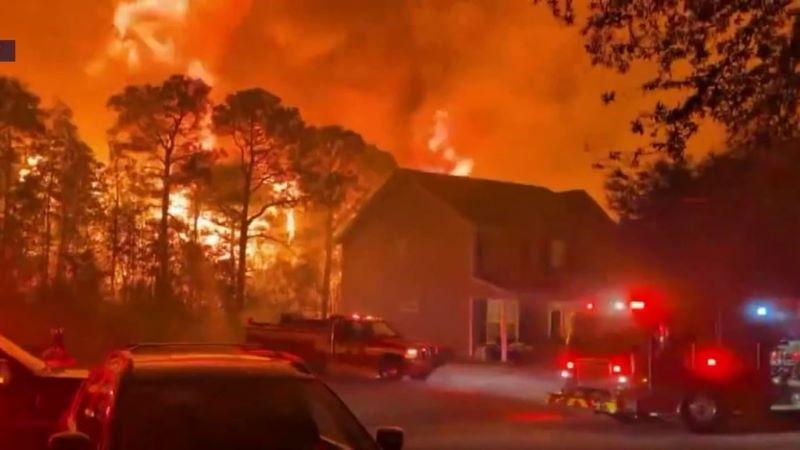South Carolina Wildfires: State of Emergency Declared as Thousands of Acres Burn, Evacuations Ordered

- devara
- 05 Mar 2025 12:21 AM
- #Nature #wildfires #South Carolina #emergency response #fire containment #weather conditions
South Carolina Governor Henry McMaster has declared a state of emergency as wildfires rage across the Carolinas and Georgia, scorching thousands of acres and forcing evacuations. The fires, fueled by unusually dry conditions and strong winds, have led to widespread damage and firefighting efforts involving hundreds of personnel. As the blazes continue, authorities are working around the clock to prevent further destruction, with a cold front expected to bring relief by Tuesday. According to the South Carolina Forestry Commission, more than 175 fires were reported over the weekend, with the majority occurring on Saturday. By Sunday evening, the number of new fires had significantly decreased, and most had been contained. However, five major fires remained active by Monday, including one near Myrtle Beach that burned approximately 1,600 acres and was only 30% contained. Additional fires in Williamsburg and Beaufort counties added to the growing crisis.
The Myrtle Beach fire, which impacted the Carolina Forest area, led to the evacuation of eight neighborhoods. Heavy smoke blanketed the region, reducing visibility and prompting road closures. The fire spread rapidly due to shifting winds, creating unpredictable conditions for both residents and firefighters. Those living near the fire described terrifying scenes, with flames quickly rising and black smoke filling the sky. In response to the escalating crisis, the South Carolina Army National Guard deployed two Black Hawk helicopters to drop water over the affected areas. Each helicopter carried 600 gallons of water per drop in an attempt to slow the spread of the fire. Additionally, emergency shelters were set up for displaced residents, with the Red Cross of South Carolina providing temporary housing for over 135 people at a county recreation center. Other community spaces, such as the Carolina Forest Community Church, opened their doors to evacuees and exhausted firefighters.Despite the severity of the fires, no injuries or structural damage have been reported so far. However, fire officials caution that the situation remains dangerous, and containment efforts are still ongoing. Around 410 firefighting personnel and at least 128 fire engines have been deployed to battle the flames. Local authorities continue to monitor the situation closely, urging residents to stay alert and prepared for further evacuations if necessary.
The wildfires in South Carolina are not the only ones affecting the region. North Carolina has also been battling multiple fires, with four major ones still active as of Monday. The 176 Fire near Tryon has burned 481 acres and is only 30% contained. In addition, fires in North Carolina’s Croatan, Nantahala, Uwharrie, and Pisgah national forests have consumed nearly 500 acres in total.Georgia is also experiencing significant wildfire activity, with six active fires burning across the state as of Sunday. Over the past week, nearly 3,700 acres have been scorched, fueled by strong winds and low humidity. Meanwhile, Tennessee reported 81 wildfires within the past seven days, covering approximately 822 acres. While most of these fires have been contained, the widespread impact highlights the dangerous conditions across the Southeastern United States.Meteorologists attribute the severe fire conditions to an ongoing drought and the effects of La Niña, which typically results in warmer and drier winters in the Carolinas. A high-pressure system has been responsible for keeping rain away from the region, leading to critically low humidity levels. The U.S. Climate Prediction Center has warned that moderate drought conditions will likely persist across much of the Carolinas, with some areas expected to experience severe drought through early spring.
Firefighters are hoping for relief as a cold front approaches the region, potentially bringing rain by Tuesday night. While this could help slow the spread of the wildfires, dry conditions and light winds will continue to pose challenges in the coming days. Authorities are urging residents to remain cautious, avoid outdoor burning, and report any new fire outbreaks immediately. Governor McMaster’s emergency declaration is expected to provide additional resources to first responders, ensuring that firefighters have the necessary equipment and personnel to combat the flames effectively. He praised the dedication of emergency crews, emphasizing the risks they face to protect communities from destruction.While the immediate danger from the wildfires may subside with incoming rain, officials warn that fire season in the Carolinas is far from over. With continued dry conditions and unpredictable weather patterns, the risk of new fires remains high. Residents are encouraged to stay informed through official channels and take necessary precautions to safeguard their homes and communities.
As the situation evolves, local and state authorities will continue to monitor fire activity and implement safety measures as needed. The collaboration between state agencies, emergency responders, and community organizations is playing a crucial role in managing this crisis and minimizing damage. For those affected, support systems are in place, and officials urge anyone in need of assistance to reach out to local relief organizations.The wildfires in South Carolina, North Carolina, Georgia, and Tennessee serve as a stark reminder of the increasing threat posed by extreme weather conditions. With climate patterns becoming more unpredictable, preparedness and rapid response will be key in mitigating future wildfire risks across the region.












































